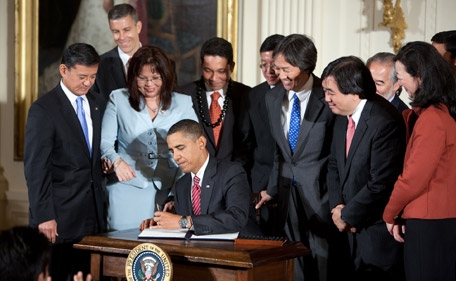
This year, we reached an important milestone.
2013 marks the four-year anniversary of the White House Initiative on Asian Americans and Pacific Islanders under President Obama. Since President Obama signed the Executive Order reestablishing the Initiative and the President’s Advisory Commission on AAPIs in October 2009, we have worked to open the doors of government to the AAPI community.
We’ve partnered with agencies throughout the government and community organizations across the country to improve the quality of life for our community. As we mark our four-year anniversary, we are proud of the work we’ve accomplished for AAPI communities, including:
- Building an Engagement Infrastructure: We’ve hosted over 200 national gatherings, roundtables, open dialogues, and workshops in 50 cities, reaching more than 30,000 people. Federal agencies learned about local demographic trends, challenges faced by immigrant and refugee communities, and ways in which community leaders, non-governmental organizations, and small businesses have joined forces to create and build thriving communities.
- Advancing Data Collection, Analysis and Dissemination: To promote best practices on data disaggregation in the AAPI community, the Initiative partnered with the Office of Budget and Management to release a working paper on agency approaches. We also hosted iCount: Equity through Representation, a symposium that addressed the hurdles educational institutions and community groups face to achieving data disaggregation and brainstormed best practices to implementing data disaggregation systems at those institutions.
- Protecting Vulnerable Populations: We created interagency working groups to address the needs and concerns of Hmong farmers and nail salon worker health and safety to break down barriers that vulnerable communities face. The Initiative also released an AAPI women’s record to bring attention to issues impacting AAPI women and girls, including domestic violence, trafficking, and health care.
- Increasing Investment and Building Capacity: We convened the National Philanthropic Briefing, bringing together more than 200 foundation leaders, federal officials, and community leaders. As a result of the briefing, the Ford Foundation, the W.K. Kellogg Foundation, and the Kresge Foundation made an initial $1 million commitment in the form of a planning grant to assist the AAPI community with creating public-private partnerships.
- Raising Health Awareness: To raise awareness of the Affordable Care Act among AAPIs with limited English proficiency, we have also held in-language Google Hangouts in Korean and Vietnamese, with a Chinese language Hangout expected in January 2014.
- Increasing Opportunities for AAPI Employees in the Federal Workforce: We helped launch the Senior Executive Service (SES) Development Program to help identify and aid applicants in preparation for the SES selection process through intensive training, education, and mentoring. The program has completed its second year, graduating 20 candidates from 12 federal departments and offices, and has opened applications for its third year.
We have been inspired by the community’s energy, expertise, and efforts. And together, we’ve accomplished a great deal. As we celebrate this milestone, take a look at our special video message to hear more about some of our key accomplishments.
This work is only the beginning. We know there is so much more to be done. We will continue to build upon our efforts by opening doors to better education, better health, better jobs, and a better America where Asian Americans and Pacific Islanders can rest assured that federal government programs and services will be accessible to them.
Read more highlights of our work over the past four years.
Kiran Ahuja is Executive Director of the White House Initiative on Asian Americans and Pacific Islanders.
Daphne Kwok is Chair of the President’s Advisory Commission on Asian Americans and Pacific Islanders.


